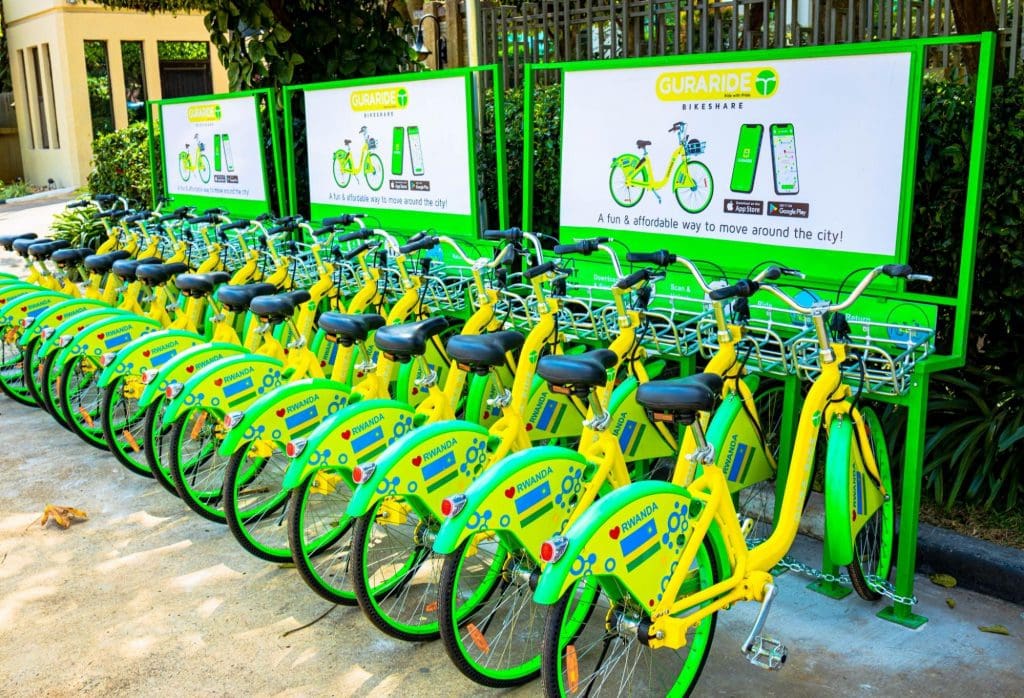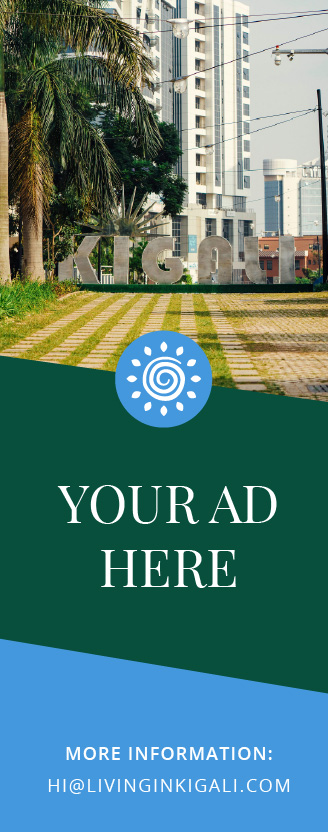Transport in Kigali has improved massively in recent years. Good roads, decent traffic management, robust public transport, and the introduction of ride-hailing apps make getting around way easier than most major cities in Africa.
Born and living in the city I’ve witnessed how greatly our transport system has improved and keeps getting better. So, I wrote this guide to help you navigate the various options available.
[toc]
Traffic in Kigali
Traffic in Kigali usually moves without too many delays or congestion. Kigali’s extensive road network means you can usually find an alternative route if you get stuck in a jam.
Traffic can get dense during rush hours, around 7:30-8:00 am and 5:30-7 pm when people are going to or from work.
Traffic also gets congested when special events are happening, such as bicycle tournaments or COVID19 curfews. Stay up-to-date on events in Kigali to ensure they don’t cause you any disruption.
Walking in Kigali
Walking in Kigali is both pleasant and easy.
The city’s clean environment, extensive footpaths, and lack of traffic make walking super easy and enjoyable, whether you’re out for a stroll or walking to work.
If you’re downtown, check out the Kigali CarFree Zone, which has been transformed specifically for pedestrians.
The areas I’d recommend to go for a walk are Gaculiro and Nyarutarama roads as they are quieter and not so busy with traffic.
Safety While Walking
Even though Kigali is a very safe city, take precautions while walking, especially at night. Muggings and snatch-and-grab thefts from passing motorbike drivers are common. Don’t walk with your phone out.
Try not to walk alone on quiet streets at night. Opportunistic thieves are especially bold just before Covid curfew because they know you won’t have a chance to report them or find help before you have to return home.
If it’s close to curfew time, look for a taxi.
Cycling in Kigali

Photo by Gura Ride
Cycling is hugely popular in Kigali, and not just because it’s cheap. The good roads, light traffic, and cool climate make Kigali a great city to cycle in.
However, the rolling hills mean you’ll need to be fit.
There are plenty of bicycle shops in Kigali selling new and secondhand rides. The best are:
- Hope Line Sports
- Titanium Smart Life
- The Shop
People also often post secondhand bikes for sale in our Living in Kigali Facebook community, so you can easily get an excellent deal on there, too.
It’s also possible to rent a bicycle to move around. You can rent one at Kairos Cycling or Kigali Rides. View more locations to buy or rent a bicycle here.
Finally, if you just want to try out cycling in Kigali, or you only need a bike for a quick trip across the city, Gura Ride is an excellent bike-sharing app that has launched in Kigali.
Bikes are docked at stations throughout the city, including the Marriott Hotel in downtown and MTN Centre in Remera. Once you’ve downloaded the app, you can use it to unlock a bike, cycle it to the next dock station, and pay a fixed fee based on the distance traveled.
Motorbike Taxis
Motorbike taxis, known as ‘motos’ in Rwanda, are still the most popular form of transport in Kigali for most people. They’re quick, cheap, convenient, and (mostly) safe.
Moto drivers usually work from ‘stations’ – junctions and roadside areas where they hang about and wait for passengers. You’ll rarely have to walk long to find one. You can also hail a passing moto from the road – but this comes with some risks.
All moto drivers in Kigali carry an extra helmet for their passengers, but due to Covid restrictions, you’ll need to wear a headscarf or shawl underneath.
Moto drivers in Kigali work on (almost) fixed fares based on distance. While they sometimes overcharge foreigners, it’s usually not too high and open to haggling. Fares between most parts of Kigali typically cost from 500-2,000 RWF.
If you don’t want to haggle the fare, the Kigali government has recently introduced mandatory smart metering on moto-taxis. The meters are attached to the bike, and you can request a driver to turn it on at the start of your ride.
Safety on Motos
- Don’t be afraid to inspect a bike and helmet provided before agreeing to ride, to ensure their both safe. The same goes for the driver. Speak to him a little to ensure he hasn’t been drinking.
- Keep an eye on the road and a driver’s speed. If you’re concerned about his driving, tell him to slow down and pay better attention.
- Watch out for the exhaust pipe when dismounting, so you don’t get burned.
- Buy a helmet and use this whenever you ride a moto. It’s safer, easiest, and more hygienic.
Extra Tips for Taking Motos
- If the driver doesn’t know the location you’re driving to, ring someone at your destination who speaks Kinyarwanda and ask them to give him directions.
- If you find a reliable driver you use often, take his number to pick you up and take you around. It’s safer, cheaper, and more reliable than using different drivers all the time.
- It’s illegal for a moto to take than one passenger at a time. If you need an extra ride, ask the driver to find you a 2nd (or 3rd) ride and travel together.
- If you’re in a rush, make sure the driver has a full tank, so you don’t get stuck filling up on the way.
- If you need to hold onto anything, there are bars below the passenger’s seat. Don’t grab or hug your driver!
Taxi Apps
Kigali has two taxi and ride-hailing apps: Move and Yego Cabs. Both works are available on Android devices and iPhones.
Move is exclusively available to drivers of Volkswagen cars, so there are fewer drivers, but it’s a much more comfortable ride.
For Yego cabs, you can also call 9191, a toll-free number, to order your ride.
Using taxi apps in Kigali requires a lot of patience.
Many drivers still aren’t used to using the apps, and will ring you to confirm your pickup and drop-off location. They may need help with directions, which can be challenging if you don’t speak Kinyarwanda or French. And if you cancel a ride, they may not notice, turn up anyway, and then get angry you’ve wasted their time.
Public Transport
Buses are the most common form of public transport in Kigali. Busses are modern, comfortable, and run on set schedules and routes. Destinations and routes are marked by the colours of the buses and a screen at the front.
Bus stations in Kigali are known as ‘taxi parks,’ and you’ll usually find one in every neighbourhood. You can also catch a bus at a bus stop. There are many bus stops around the city, so don’t worry about walking a long distance to find one.
Tap&Go Cards
To board a bus, you’ll need a “Tap & Go” card. These cards are available in every taxi park and most bus stops.
You can top the cards in the following ways:
- Visit vendors at the taxi parks and bus stops
- Using MTN Mobile Money by dialing *182*2*5#
- Downloading the Tap&Go app on your phone
Driving in Kigali
Driving around the city is easy! Just make sure you pay attention to the signs indicating the right speed and restricted areas to drive through. There are many parking places around the city, just keep in mind that you’ll need to pay for parking in most public spaces.
Rent a Car in Kigali
There are plenty of companies and private individuals renting cars in Kigali. This is a great way to get around if you’re just visiting the city or you’ve moved here and want to learn how to drive in Kigali before buying a car.
The price range will depend on the type of car you want and will vary for different car rental companies in the city. Prices usually start from 20,000 – 30,000 RWF per day. However, you might also negotiate based on weekly and monthly rates.
Rent a Motorbike in Kigali
Renting a motorbike is another way to get around the city. Kigali Motorbike Rental has various options depending on the moto you want, the type of road you want to ride on, and your experience in riding a moto. You can start with a nice automatic scooter or go for a full cross-country road bike.
Prices start from 18,000 per day, with excellent discounts offered depending on how long you rent for (as little as 7,000 RWF per day).
Kigali Car Free Day
Kigali Car Free Day is a sports program introduced by the Government of Rwanda in 2016. It’s an opportunity for people to participate in physical exercise around the city on roads free of vehicles.
Kigali Car Free Day takes place twice a month, on the 1st and 3rd Sunday. Most main roads around the city are closed to vehicles for a few hours so people can make the most of them.
Getting To and From the Airport
Getting from and from Kigali airport is quite easy. The airport is conveniently located a short drive from most neighbourhoods, and there is a range of options to choose from.
Taxi
Getting a taxi to the airport is quite straightforward, and you’ll be dropped directly at the departures car park.
If you’re getting a taxi from the airport, expect to haggle, as drivers will try charging to premium to unsuspecting tourists.
Generally, taxis from the airport should cost 2500 RWF for the first kilometre, and 600 RWF per additional kilometre. Use this to calculator your fare and prepare to haggle.
Hotel Transfer
A much easier option is to organise a transfer with your hotel or host in Kigali. While it’s a little more expensive than a taxi, it’s much more convenient. And if you’re splitting the price between a group, it works out quite cheap.
Shuttle bus
Kigali Bus Service (KBS) provides hourly direct shuttles between Kigali Airport and the Union Trade Center (UTC) in the business district of central Kigali. The price of this shuttle is 1000 RWF.
Car rental
You can also rent a car ahead of your arrival and have it ready to ride it as soon as you arrive at the airport.
Bus and moto-taxi
You can take a bus or moto to the airport, but you’ll need to enter via a different gate to cars and the shuttle bus service.
Traveling Outside Kigali
Traveling from Kigali to different districts usually takes 2-3 hours. However, traveling to the Western provinces can take up to 7-9 hours.
Nyabugogo Taxi Park is the central bus station in Kigali for traveling outside the city.
If you’re visiting a National Park or other tourist destinations, your tour company will usually provide transport.
Rwanda also shares a land border with Burundi, Uganda, Tanzania, and the Democratic Republic of Congo. All of these can be visited by road.
Regional busses to neighbouring countries also leave from Nyabugogo Taxi Park.
Journey times vary greatly, depending on your final destination. Traveling to Burundi usually takes about 5 hours, while the farthest destination in Tanzania is 24 hours away.
Below are the best bus companies for different countries.
Kenya and Uganda
- Kampala coach
- Simba
- Mash Cool
- Modern coach
Uganda only
- Jaguar
- Volcano
- Horizon
- Mosh Power
Tanzania
- Trinity
- Matunda express
- Select
Final Thoughts
Transport in Kigali is far superior to many neighbouring countries, and getting around the city is a breeze most of the time.
Use this guide to find the right solutions for you, and if you have any questions, ask us in the comments below.




Thanks for the good information. I’m in the process of moving to Kigali and this is exactly what i needed to know. Thanks again.